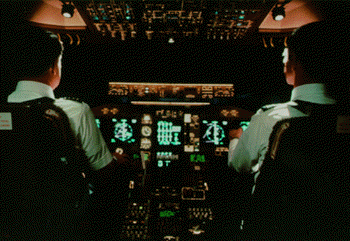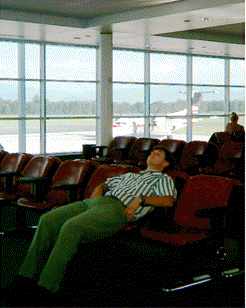
...photo courtesy of United Airlines


 Modern travelers are familiar with
another common sleep disruption--jet lag. Why do travelers flying cross-country
suffer from fatigue, gastrointestinal complaints, and shortened attention span
just from flying across a few time zones? Sleep loss alone could not account
for their interrupted circadian rhythms.
Modern travelers are familiar with
another common sleep disruption--jet lag. Why do travelers flying cross-country
suffer from fatigue, gastrointestinal complaints, and shortened attention span
just from flying across a few time zones? Sleep loss alone could not account
for their interrupted circadian rhythms.According to the Office of Technology Assessment (OTA), "...conflict between the traveler's own circadian clock and external rhythms in a new time zone is the primary agent of jet lag. The timing of meals, activity, and sleep no longer coincides with that customary in the new time zone. Furthermore, environmental cues, especially light, promote synchronization between circadian rhythms and the new time zone. Since different circadian rhythms may adjust to the new time zone at different rates, the traveler experiences a period when internally generated rhythms are no longer in synchrony with each other"[3].
The temperature cycle is in one time zone, the sleep-wake cycle quickly catches up to the new time zone; but all the other human systems are scattered somewhere else. Furthermore, many factors influence the degree to which a traveler feels jet lag: age, direction of travel (going west is better than going east), number of time zones crossed, and factors specific to the individual.